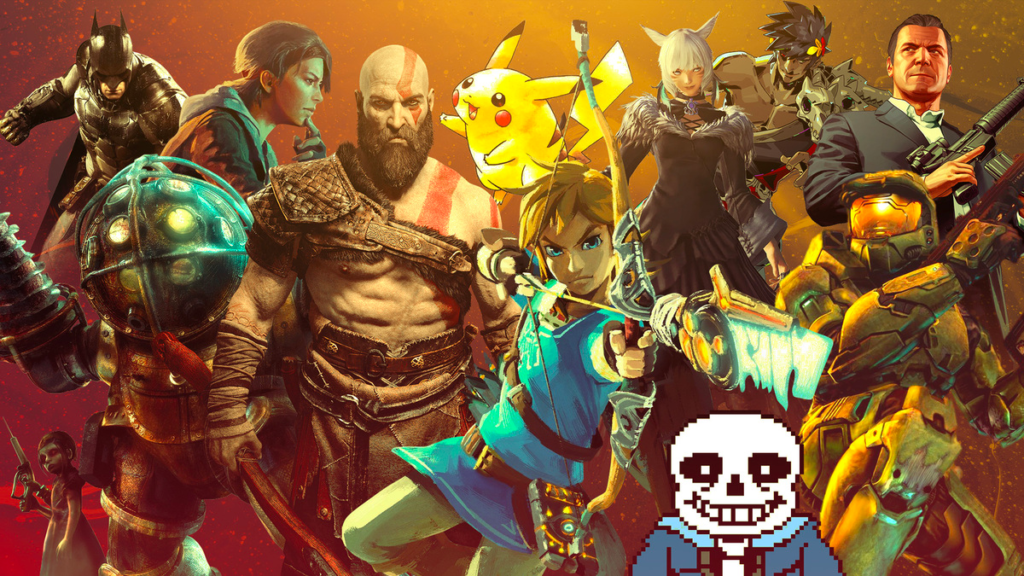The gaming industry has evolved beyond the simple pixelated games of the past into a global powerhouse that spans a variety of genres, platforms, and experiences. Today, gaming isn’t just a hobby for a select group—it’s a cultural phenomenon enjoyed by millions worldwide. With new technologies emerging and gaming trends constantly shifting, the future of gaming looks more exciting than ever. Let’s dive into the key aspects that are shaping the future of gaming, including the latest tech innovations, rising trends, and some of the top games you should keep an eye on.
1. Emerging Gaming Trends
Gaming trends are always changing, influenced by technological advancements and shifting player preferences. Some of the major trends currently dominating the gaming landscape include:
Cloud Gaming
Cloud gaming allows players to access high-quality games without the need for powerful hardware. Services like Google Stadia, Xbox Cloud Gaming, and NVIDIA GeForce Now are bringing gaming to a wide range of devices, from smartphones to low-end PCs. This trend is revolutionizing the way we play games, enabling people to stream titles on demand and eliminating the need for expensive gaming consoles or high-end PCs.
Cross-Platform Play
Gone are the days when gamers were locked into a single platform. Cross-platform play allows players to connect and compete with others, regardless of whether they’re playing on a PC, Xbox, PlayStation, or mobile device. This trend is fostering a more inclusive gaming community, as games like Fortnite, Minecraft, and Rocket League enable players to unite in a shared experience across multiple devices.
Esports and Competitive Gaming
Esports continues to grow at an exponential rate, with professional players and teams competing for multi-million-dollar prize pools. Games like League of Legends, Valorant, and Dota 2 are at the heart of the esports scene, and the rise of game streaming platforms like Twitch and YouTube Gaming has made it easier than ever for fans to watch live tournaments and follow their favorite players.
2. Game Technologies Shaping the Future
As gaming technology evolves, players are getting new, more immersive experiences. Some of the most exciting innovations in gaming tech include:
Virtual Reality (VR) and Augmented Reality (AR)
Virtual reality and augmented reality are pushing the boundaries of gaming by offering more immersive and interactive experiences. VR headsets like the Oculus Rift and PlayStation VR transport players to entirely new worlds, making them feel as if they’re truly inside the game. Augmented reality, on the other hand, blends the real world with digital elements, as seen in games like Pokémon Go. AR is making gaming more social and location-based, as players explore their surroundings to collect virtual items or engage with the game world.
Artificial Intelligence (AI) and Procedural Generation
AI and procedural generation are making games more dynamic and unpredictable. Procedural generation allows developers to create endless variations of environments, characters, and quests, ensuring that no two gaming experiences are alike. AI is being used to create smarter NPCs (non-playable characters), enhancing the overall gameplay experience by making in-game characters more responsive and realistic. Games like No Man’s Sky and Minecraft use procedural generation to create expansive, ever-changing worlds that keep players engaged.
Ray Tracing and Next-Gen Graphics
Next-gen gaming consoles like the PlayStation 5 and Xbox Series X have introduced ray tracing, a technique that simulates realistic lighting, reflections, and shadows, giving games a stunning visual upgrade. This technology is elevating the graphics of games like Cyberpunk 2077, Spider-Man: Miles Morales, and Ratchet & Clank: Rift Apart, making virtual worlds look more lifelike than ever before.
3. Popular Game Genres to Watch
Gaming has a diverse range of genres that appeal to all types of players. Here’s a look at some of the most popular genres in gaming today and what makes them so special:
Action and Adventure
Action games, such as The Legend of Zelda: Breath of the Wild, Spider-Man, and Red Dead Redemption 2, combine fast-paced gameplay with open-world exploration. Players are immersed in expansive worlds where they can complete missions, solve puzzles, and engage in thrilling combat. These games typically feature rich storylines and memorable characters, making them favorites among gamers.
Role-Playing Games (RPGs)
RPGs continue to captivate players with their complex narratives, character customization, and vast worlds to explore. Games like The Witcher 3: Wild Hunt, Final Fantasy VII Remake, and Cyberpunk 2077 are prime examples of RPGs that immerse players in intricate storylines and allow them to shape the outcome of their adventures.
Multiplayer Online Battle Arenas (MOBAs)
MOBAs, such as League of Legends, Dota 2, and Smite, are popular for their strategic depth and team-based gameplay. These games require players to work together to control the map and defeat the opposing team. MOBAs have become staples of the esports scene, with massive competitive leagues and tournaments drawing millions of viewers each year.
Battle Royale
The battle royale genre exploded in popularity with games like Fortnite, PUBG, and Apex Legends. These games feature a large number of players competing in a shrinking arena, with the goal of being the last one standing. The tension and fast-paced action make battle royale games incredibly exciting and addictive, and their accessibility on consoles and mobile devices has contributed to their massive success.
Strategy and Simulation
Strategy games, such as Age of Empires IV, Civilization VI, and XCOM 2, require players to plan ahead and use their resources wisely to achieve victory. These games often involve managing armies, cities, or entire civilizations, making them perfect for players who enjoy thoughtful, calculated gameplay. Additionally, simulation games like The Sims and Cities: Skylines allow players to create and manage virtual worlds, offering a relaxing yet engaging experience.
4. The Future of Gaming: What’s Next?
As technology continues to advance, the future of gaming is full of exciting possibilities. Here are some predictions for where gaming is headed:
The Metaverse
The idea of the metaverse, a virtual universe where players can interact in a shared online space, is gaining traction. Companies like Facebook (now Meta) and Epic Games are already working on creating these expansive virtual worlds, where players can not only game but also socialize, attend concerts, and create digital experiences.
AI-Driven Experiences
As AI technology improves, we’ll see more games that adapt to the player’s actions and decisions. AI-driven narratives, personalized gameplay, and smarter NPCs will make games feel more alive and responsive, offering more dynamic and interactive experiences.
More Immersive Experiences
With the continued development of VR, AR, and haptic feedback technology, gaming will become even more immersive. The goal is to create experiences where players can truly feel like they’re part of the game world, whether it’s through realistic graphics, responsive environments, or innovative gameplay mechanics.
Conclusion
The gaming industry is constantly evolving, and the future of gaming is bright. From cloud gaming and cross-platform play to virtual reality and AI-driven experiences, new technologies are transforming how we play and experience games. As these trends continue to develop, we can expect even more innovative and exciting games that push the boundaries of what we thought was possible.
Whether you’re a casual gamer or a hardcore enthusiast, the future of gaming promises to deliver new adventures, challenges, and immersive experiences. The next generation of gaming is here, and it’s only going to get better.



